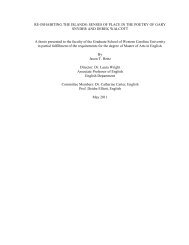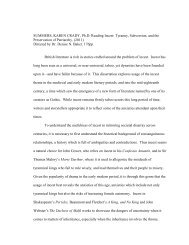THE DEVELOPMENT OF EXECUTIVE FUNCTION IN EARLY ...
THE DEVELOPMENT OF EXECUTIVE FUNCTION IN EARLY ...
THE DEVELOPMENT OF EXECUTIVE FUNCTION IN EARLY ...
You also want an ePaper? Increase the reach of your titles
YUMPU automatically turns print PDFs into web optimized ePapers that Google loves.
Frye, D., & Zelazo, P D. (2003). The development of young children's action control and awareness. In J.<br />
Roessler & N. Eilan (Eds.), Agency and self-awareness: Issues in philosophy and psychology. Oxford: Oxford<br />
University Press.<br />
Frye, D., Zelazo, P. D., Brooks, P. J., & Samuels, M. C. (1996). Inference and action in early causal reasoning.<br />
Developmental Psychology, 32, 120-131.<br />
Frye, D., Zelazo, P. D., & Burack, J. A. (1998). I. Cognitive complexity and control: Implications for theory of<br />
mind in typical and atypical development. Current Directions in Psychological Science, 7, 116-121.<br />
Frye, D., Zelazo, P D., & Palfai, T. (1995). Theory of mind and rule-based reasoning. Cognitive Development,<br />
10, 483-527.<br />
Fuster, J. (1995). Memory in the cerebral cortex: An empirical approach to neural networks in the human and<br />
nonhuman primate. Cambridge, MA: MIT.<br />
Gathercole, S. E. (1998). The development of memory. Journal of Child Psychology & Psychiatry & Allied<br />
Disciplines, 39, 3-27.<br />
Gelman, R. (1969). Conservation acquisition: A problem of learning to attend to relevant attributes. Journal of<br />
Experimental Child Psychology, 7, 167-187.<br />
Gernsbacher, M. A., & Robertson, R. W. (1995). Reading skill and suppression revisited. Psychological<br />
Science, 6, 165-169.<br />
Gerstadt, C. L., Hong, Y. J., & Diamond, A. (1994). The relationship between cognition and<br />
action: Performance of children *7 years old on a Stroop-like day-night test. Cognition, 53, 129-<br />
153.<br />
Gladstone, R. (1969). Age, cognitive control and extinction. Journal of Experimental Child Psychology, 7, 31-<br />
35.<br />
Goldberg, E., & Bilder Jr., R. M. (1987). The frontal lobes and hierarchical organization of cognitive control. In<br />
E. Perecman (Ed.), The frontal lobes revisited. Hillsdale, NJ: Erlbaum.<br />
Goldberg, M. C., Maurer, D., & Lewis, T. L. (2001). Developmental changes in attention: the effects of<br />
endogenous cueing and distractors. Developmental Science, 4, 209-219.<br />
Goldman, P. S., Crawford, H. T., Stokes, L. P, Galkin, T W., & Rosvold, H. E. (1974, November 8). Sexdependent<br />
behavioral effects of cerebral cortical lesions in the developing rhesus monkey. Science, 186, 540-<br />
542.<br />
Goldman-Rakic, P. S. (1987). Circuitry of primate prefrontal cortex and regulation of behavior by<br />
representational knowledge. In F. Plum & V. Mountcastle (Eds.), Handbook of physiology-The nervous system<br />
V. Bethesda, MD: American Physiological Society.<br />
Gollin, E. (1966). Solution of conditional discrimination problems by young children. Journal/ of Comparative<br />
and Physiological Psychology, 62, 454-456.<br />
Gopnik, A., & Astington, J. W. (1988). Children's understanding of representational change and its relation to<br />
the understanding of false belief and the appearance reality distinction. Child Development, 59, 26-37.<br />
Gordon, A. C. L., & Olson, D. (1998). The relation between acquisition of a theory of mind and information<br />
processing capacity. Journal of Experimental Child Psychology, 68, 70-83.<br />
Goschke, T. (2000). Intentional reconfiguration and involuntary persistence in task switching. In S. Monsell &<br />
J. Driver (Eds.), Attention and performance XVIII: Control of cognitive processes. Cambridge, MA: MIT Press.<br />
Grant, D. A., & Berg, E. A. (1948). A behavioral analysis of degree of reinforcement and ease of shifting to<br />
new responses in a Weigl-type card-sorting problem. Journal of Experimental Psychology, 38, 404-411.<br />
Hala, S., Hug, S., & Henderson, A. (2003). Executive function and false belief understanding in preschool<br />
children: Two tasks are harder than one. Journal of Cognition and Development, 4, 275-298.<br />
Halford, G. S., Andrews, G., Dalton, C., Boag, C., & Zielinski, T. (2002). Young children's performance on the<br />
balance scale: The influence of relational complexity. Journal of Experimental Child Psychology, 81, 417-445.<br />
Halford, G. S., Wilson, W. H., & Phillips, S. (1998). Processing capacity defined by relational complexity:<br />
Implications for comparative, developmental, and cognitive psychology. Behavioral & Brain Sciences, 21,<br />
803- 864.<br />
Happaney, K. R., & Zelazo, P. D. (in press). Inhibition as a problem in the psychology of<br />
behavior. Developmental Science.
















